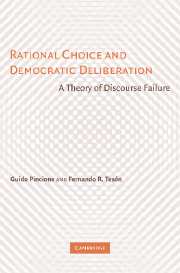Book contents
- Frontmatter
- Contents
- Preface
- Acknowledgments
- 1 Introduction
- 2 The Epistemic Argument for Deliberation
- 3 The Rational Choice Framework
- 4 The Resilience of Discourse Failure
- 5 Symbolism in Political Argument
- 6 Discourse Failure and Political Morality
- 7 Non-Epistemic Defenses of Deliberation
- 8 Deliberation, Consent, and Majority Rule
- 9 Overcoming Discourse Failure: Voluntary Communities
- Index
2 - The Epistemic Argument for Deliberation
Published online by Cambridge University Press: 05 May 2010
- Frontmatter
- Contents
- Preface
- Acknowledgments
- 1 Introduction
- 2 The Epistemic Argument for Deliberation
- 3 The Rational Choice Framework
- 4 The Resilience of Discourse Failure
- 5 Symbolism in Political Argument
- 6 Discourse Failure and Political Morality
- 7 Non-Epistemic Defenses of Deliberation
- 8 Deliberation, Consent, and Majority Rule
- 9 Overcoming Discourse Failure: Voluntary Communities
- Index
Summary
Political Illiteracy: An Illustration
Consider one argument often given by people who defend trade barriers (e.g., quotas, tariffs, and subsidies). Protectionism is needed, they claim, to preserve domestic jobs. Domestic industries that lose out to foreign competitors have to downsize or go out of business, and thus lay off workers. Foreign workers and some local firms may gain from trade liberalization, but the welfare of our workers requires that we erect protectionist barriers. We owe a duty of solidarity to our fellow citizens in an economic context where what they lose, foreigners gain. If our goal is to preserve domestic jobs, we should protect industries threatened by foreign competition.
The argument gains credibility from the obvious fact that domestic industries affected by foreign competition do suffer financially and so lay off workers. Who the precise losers and winners are is left obscure in this argument, but this much seems to be common to all protectionist positions: Trade is not mutually advantageous. Sometimes protectionists suggest that other nations' aggressive exporting strategies are unfair. This position is more moderate, as it would accept trade liberalization if trade volumes were roughly equivalent, or if everyone agreed not to protect.
Generally speaking, the protectionist argument from job loss is not supported by reliable economic theory or by empirical evidence. To be sure, the relationship between trade liberalization and employment is quite complex.
- Type
- Chapter
- Information
- Rational Choice and Democratic DeliberationA Theory of Discourse Failure, pp. 8 - 64Publisher: Cambridge University PressPrint publication year: 2006



